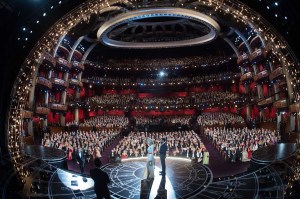
For viewing audiences, it was a broadcast where Hollywood’s current discontents could be seen in the “front-facing” parts of the show: Jack Black’s staged intrusion on host Neil Patrick Harris (and Anna Kendrick’s) opening dance numbers, where he railed, in a meta-commentary, against the reliance on superhero tentpoles, the pursuit of “Chinese money,” and other discontents in an age where Hollywood is trying to figure out what kind of stories still keep an audience engaged.
This was on the heels of Harris’ opening joke that Hollywood was there to honor its “best and whitest. Sorry — brightest,” referring to the controversies about this year’s lack of diversity in the nominee selection, particularly the shutout of Selma from directing and acting consideration.
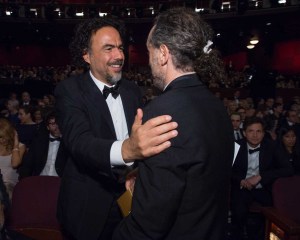
Backstage, another drama unfolded, in a kind of parallel, expanded dimension, as various winners addressed the press at length, uninterrupted by orchestra cues and commercial breaks.
So even though the Oscars weren’t marked by the kind of film biz-specific controversies of previous years, like when Life of Pi won for best visual effects, while its post house, Rhythm and Hues, had filed for bankruptcy, many backstage comments expanded on the evening’s general themes – that all was not quite right in the world, and it was up to us, together, to figure out a way to change it.
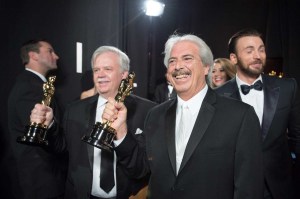
A different take on inclusiveness as offered up by visual effects winner Paul Franklin, whose work on Interstellar, along with his colleagues, copped the VFX Oscar, wresting back the momentum that Dawn of the Planet of the Apes may have had coming out of the VES awards. When asked about the role that physicist Kip Thorne had in making the space effects seem as real as possible, Franklin said, “He gave us the math, the physics which describes the universe and how these extraordinary things would actually look if you were able to go and see them. So every year we get closer and closer to reality, and so this is, as I said in my speech, it’s showing us the outrageous beauty of the universe.”
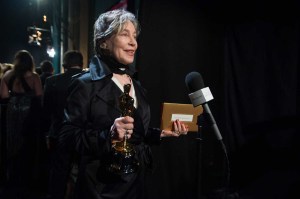
The winners seemed more acutely aware than usual, this year, of what it meant to have suddenly been granted such a public platform for doing work that for many was intensely personal, while somehow, luckily, finding enough of a commercial spark to become part of the awards mix. But few of them knew where the journey would take them.
This was echoed by Pawel Pawlikowski, director of best foreign language film Ida, a Polish film set in the ’60s, looking at secrets buried since the Holocaust. When asked to expand on his onstage comments about his own crew’s celebratory drinking back home, he talked of “a spirit on the set because they realized that we’re making some kind of weird film that’s not like their usual kind of industrial film. We could take risks together.”
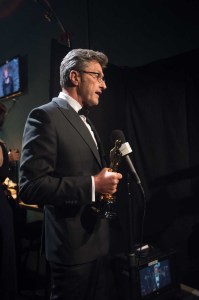
And it seemed to be an array of meaningful work that divvied up awards, with Grand Budapest Hotel coming closest to a below-the-line favorite, as it nabbed prizes for production design – the first for Adam Stockhausen and his decorator, Anna Pinnock – costume, makeup and hairstyling and score.
In the latter category, this was composer Alexandre Desplat’s first win after eight nominations, and he was even competing against himself for his work on Imitation Game this year. Desplat echoed what Budapest’s other winners said, noting that “Wes, as any great director, is very detailed. He likes to be precise,” or as makeup winner Frances Hannon said, “the film is edited by the time you start it.”
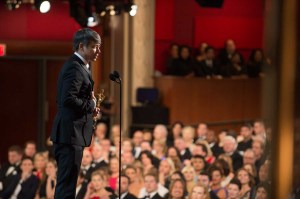
When Emmanuel Lubezki won his second straight statue, this time for Birdman’s cinematography, he also talked about his own director’s precision, though at first Iñárritu’s singular vision seemed too much. “Well, the first time he talked about the movie, he said he wanted to do a movie in one shot before I read the script. And at that moment, I truly, honestly thought I hope he doesn’t offer me this movie. It sounds like a nightmare. And then when he brought the script and talked about the characters and why it had to be one shot, he captivated me. We went through the process and made this movie happen.”
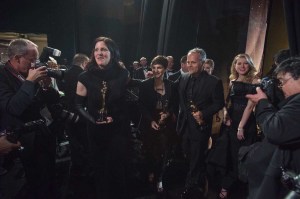
“Well, look at this room. I don’t know how many nationalities are in this room, but I don’t feel different to anybody of you here. You know, it can be from any continent, from any language. I don’t care. I feel very related to any of you. So I, as an artist, as a human, as a filmmaker, I cannot have these stupid borders, flags and passports. Those are a concept that were invented by a human society. But, honestly, naked, in tighty-whities, we will be the same.”
Whether the awards to be handed out next year to those wearing tuxes and evening gowns over their own tighty-whities, will evoke such calls for recognizing our common humanity, remains to be seen.
But for tonight, a wee bit common beauty, or at least the ability to be fruitfully “weird,” was celebrated in Hollywood. Particularly in the parallel dimension where a more thoughtful Oscar show unfolds, away from the network cameras.
The winners of the 87th Academy Awards are:
Performance by an Actor in a Supporting Role
J.K. Simmons in Whiplash
Achievement in Costume Design
The Grand Budapest Hotel
Milena Canonero
Achievement in Makeup and Hairstyling
The Grand Budapest Hotel
Frances Hannon and Mark Coulier
Best Foreign Language Film of the Year
Ida, Poland
Best Live Action Short Film
The Phone Call
Mat Kirkby and James Lucas
Best Documentary Short Subject
Crisis Hotline: Veterans Press 1
Ellen Goosenberg Kent and Dana Perry
Achievement in Sound Mixing
Whiplash
Craig Mann, Ben Wilkins and Thomas Curley
Achievement in Sound Editing
American Sniper
Alan Robert Murray and Bub Asman
Performance by an Actress in a Supporting Role
Patricia Arquette in Boyhood
Achievement in Visual Effects
Interstellar
Paul Franklin, Andrew Lockley, Ian Hunter and Scott Fisher
Best Animated Short Film
Feast
Patrick Osborne and Kristina Reed
Best Animated Feature Film of the Year
Big Hero 6
Don Hall, Chris Williams and Roy Conli
Achievement in Production Design
The Grand Budapest Hotel
Production Design: Adam Stockhausen; Set Decoration: Anna Pinnock
Achievement in Cinematography
Birdman or (The Unexpected Virtue of Ignorance)
Emmanuel Lubezki
Achievement in Film Editing
Whiplash
Tom Cross
Best Documentary Feature
CitizenFour
Laura Poitras, Mathilde Bonnefoy and Dirk Wilutzky
Achievement in Music Written for Motion Pictures (Original Song)
“Glory” from Selma
Music and Lyric by John Stephens and Lonnie Lynn
Achievement in Music Written for Motion Pictures (Original Score)
The Grand Budapest Hotel
Alexandre Desplat
Original Screenplay
Birdman or (The Unexpected Virtue of Ignorance)
Written by Alejandro G. Iñárritu, Nicolás Giacobone, Alexander Dinelaris, Jr. & Armando Bo
Adapted Screenplay
The Imitation Game
Written by Graham Moore
Achievement in Directing
Birdman or (The Unexpected Virtue of Ignorance)
Alejandro G. Iñárritu
Performance by an Actor in a Leading Role
Eddie Redmayne in The Theory of Everything
Performance by an Actress in a Leading Role
Julianne Moore in Still Alice
Best Motion Picture of the Year
Birdman or (The Unexpected Virtue of Ignorance)
Alejandro G. Iñárritu, John Lesher and James W. Skotchdopole, Producers





